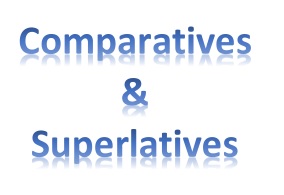Hello everyone!
Today we are going to talk about comparative and superlative adjectives. I am sure you all have seen sentences like the following:
- Swimming is easier than playing tennis
- Playing tennis is more difficult than swimming
We use more (…) than to say that something (or somebody) is better or exists in a bigger amount than something else and we use less (…) than to express the opposite, this is that something (or somebody) is worse or exists in a lesser amount than something else .
Now look at these sentences:
- Rafa Nadal is the most talented tennis player in the world
- ‘We do not believe in you’ is the least interesting book I have ever read.
We use the superlative forms when we want to say that someone or something is the best (or worst) .
-er than or more (…) than, the -est (…) or the most (…)?
In order to know whether we need to add a prefix (-er for comparative or -est for superlatives) or the words more (comparative) or most (superlative) before the adjectives, we need to check the number of syllables they have and follow the rules below:

Note that some adjectives form the comparative and superlative forms in an irregular way:
Good – Better than – The best
Bad – Worse than – The worst
Far – Further than – The furthest
Far – Farther than – The farthest
Then, what if I want to say that something is not better or worse but equal to something else? Then I use the following structure:
‘Jamie is as tall as Anna’ (Jamie and Ana are the same height)
‘Jamie is so tall as Anna’ (Jamie and Ana are the same height)
Do you want to give it a try? Go to the following links to practice comparatives and superlatives:
British Council Learn English (teens)
British Council Comparatives and Superlatives (Learn English)
Have an awesome week and a great Thanksgiving! 🙂

